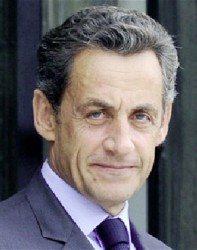PARIS, (Reuters) – Former President Nicolas Sarkozy said yesterday France’s justice system was being used for political ends, after he was put under investigation on suspicion of using his influence to gain details of a probe into his 2007 election campaign.

The judicial step, which often but not always leads to trial, is a major setback to Sarkozy’s hopes of a political comeback after his 2012 defeat by Socialist Francois Hollande.
The conservative politician denies wrongdoing in a string of investigations where his direct or indirect implication has cast doubt on his viability as a candidate in the 2017 elections.
“I say to all those who are listening or watching that I have never betrayed them and have never committed an act against the Republic’s principles and the rule of law,” Sarkozy said in his first interview since losing the 2012 election.
“The situation is sufficiently serious to tell the French people where we stand on the political exploitation of part of the legal system today.”
In the 17-minute interview on broadcaster TF1’s national evening news, a determined and angry Sarkozy launched an attack on the magistrates who had placed him under investigation, saying they had wanted to “humiliate” him.
Describing the accusations against him as “grotesque”, he accused Justice Minister Christiane Taubira and Prime Minister Manuel Valls of manipulating the process and being aware of details of the probe they should not have known.
“I passionately love my country and I am not a man who gets discouraged in the face of dirty tricks and political manipulations,” Sarkozy said.
Magistrates are looking at whether Sarkozy used his influence to secure leaked details of an inquiry into alleged irregularities in his victorious 2007 campaign. He is suspected of influence-peddling, corrupting officials, and benefiting from breach of professional secrets, the prosecutor’s office said.
The first former president to spend time in police custody, Sarkozy, 59, was detained for 15 hours on Tuesday before appearing before investigating magistrates who will run the inquiry. He was then released without bail.
Sarkozy “has gone through other ordeals of this nature, he has always known how to fight”, said Paul-Albert Iweins, the attorney for Sarkozy’s own attorney, Thierry Herzog, who is also being investigated for influence-peddling along with a judge involved in the affair.
Iweins said the inquiry was weak as it relied on legally questionable phone taps of conversations between Sarkozy and Herzog as well as between Herzog and the president of the French Bar.
Sarkozy’s allies cast doubt over the impartiality of one of the investigating magistrates, with Christian Estrosi, the mayor of Nice, telling France Info state radio that Hollande’s government had whipped up “an atmosphere of hate”.
Valls dismissed suggestions of a plot.
Investigating magistrates have a unique and powerful role under French law, both gathering evidence and determining whether it is solid enough for a trial. After the inquiry, the magistrate can drop the case for lack of evidence or “charge” the accused, sending the case to trial.
Influence-peddling can be punished by up to five years in prison and corrupting officials can trigger a sentence of up to 10 years.
It was the second time the ex-president, who lost immunity from legal prosecution a month after he left office in June 2012, had been placed under such a judicial probe. The first was in 2013 but magistrates later dropped the case against him.
Six legal cases, including this one, hang over the ex-president’s head, a shadow that many in his fractured UMP party believe compromises his ability to lead a comeback in 2017.
“DISASTROUS” LEGAL SAGA
“This legal saga is disastrous,” wrote Le Monde daily in a front-page editorial. “Each of these episodes … demonstrate that for its actors and the leading one in particular, the end justifies all the means.”





